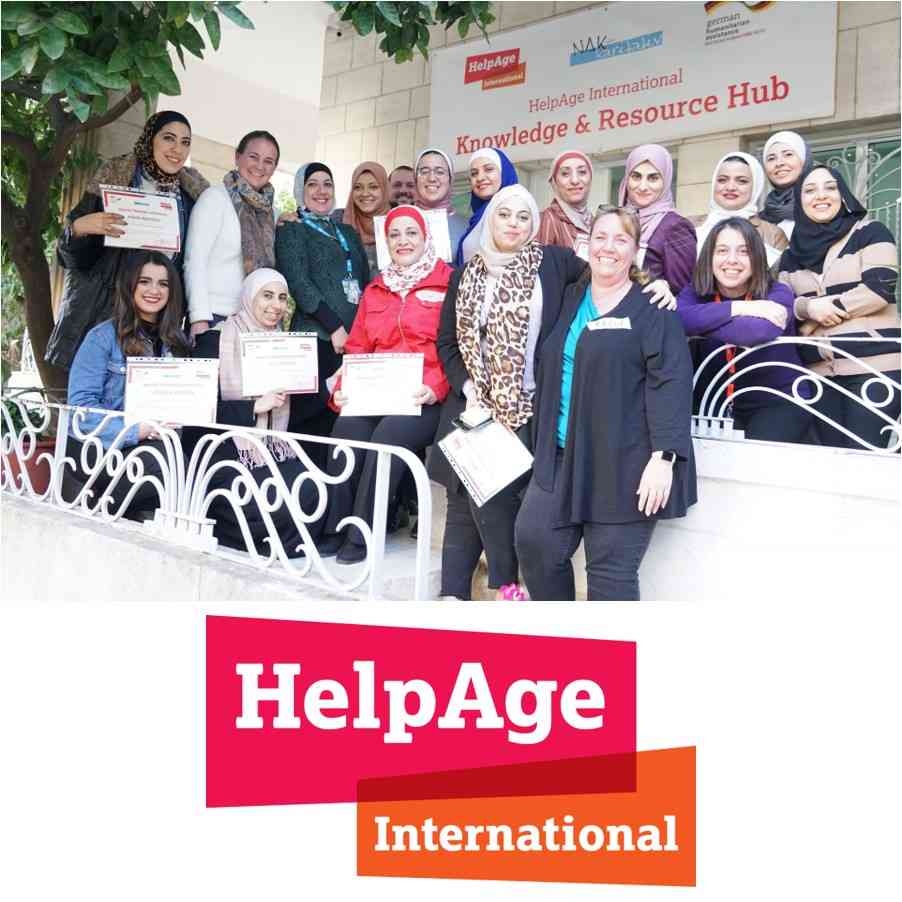HelpAge International
HelpAge International promotes the wellbeing and inclusion of older women and men, reducing poverty and discrimination in later life. We are also committed to help older people be effectively included in humanitarian relief efforts and disaster risk management processes.
Description
Ageing is transforming the world, and by 2050, 20% of the global population will be over 60.
HelpAge International aims to bring lasting, positive change to the lives of older women and men, many of whom live in areas that are insecure and prone to crisis and natural hazards.
Our vision is laid out in our Strategy 2030, at the centre of which is our role as a convener, supporter and thought leader of an international movement for change: the HelpAge global network. This is made up of 158 partner organisations across 86 countries who seek to promote the dignity, wellbeing and voice of older people around the world.
Disaster risk management often fails to consider the wisdom and needs of older people before, during, and after disasters. We work to ensure that they are included in immediate and long-term humanitarian relief efforts on the ground, in policies, and in guidelines.
We facilitate community cohesion, advocate for the dignity of older people, increase awareness, and support policy change such as in facilitating the collection of pensions, among others.
Our work to build the resilience of older people includes: COVID-19 response, capacity building for catering the needs of older people during disasters, and information management systems for disaster preparedness.
During the COVID-19 pandemic, is based on the evidence of the high risks older people face. A health crisis can isolate older people and the risk of this happening is much higher in countries with less developed health systems. We are working with local partners to address the disproportionate health risks faced by older people and mitigate against the collateral impacts of measures such as lockdowns and closures.
Our commitment to disaster preparedness and response also includes the Age and Disability Capacity Building (ADCAP) programme, aiming to improve how humanitarian agencies cater for older people and those with disabilities in emergency responses. Our humanitarian policy work ensures that older people are visible and included in humanitarian relief efforts.
Did the Sendai Framework change or contribute to changes in your activities/organization? If so, how?
The Sendai Framework proposes a significant shift from disaster management to risk management. In particular, it is underlined that older persons, as relevant stakeholders, need to be engaged in all processes relevant to disaster risk management. Moreover, the Sendai Framework stated that older persons “have years of knowledge, skills and wisdom, which are invaluable assets to reduce disaster risk, and they should be included in the design of policies, plans and mechanisms, including for early warning.” We believe our work is aligned with the Sendai Framework.
What led you to make this commitment/initiative?
What was your position before making this Voluntary Commitment / prior to the Sendai Framework?
We are motivated by a vision of a world in which all older people can lead dignified, healthy and secure lives. Reducing disaster risk and building resilience is a key element of that vision.
HelpAge was established in 1983 as a global network of older people’s organizations. It has grown steadily from five to over 158 organization and many more partners in 80 countries around the world.
Our work is based on four values: we strive for significant and lasting impact; we are inclusive; we work as committed partners; and we are passionate about learning.
Deliverables and Progress report
Deliverables
Deliverables are the end-products of the initiative/commitment, which can include issuance of publications or knowledge products, outcomes of workshops, training programs, videos, links, photographs, etc.
HelpAge International regularly produces a number of publications, newsletters, data, practical guidelines, and other resources.
We are working with local Network organisations to address the disproportionate health risks faced by older people and mitigate against the collateral impacts of measures such as lockdowns and closures.
This report looks at the extent to which older people’s rights are being upheld in emergencies and their needs met. The picture it paints is a bleak one. Although some efforts are being made to support older people, overall, the humanitarian system is failing by the standards it has set itself.
ALERT is an information management system will help humanitarian agencies to respond with greater speed, efficiency and effectiveness before and immediately after a disaster strikes.
Through Age and Disability Capacity Building (ADCAP) programme, we aim to improve how humanitarian agencies cater for older people and those with disabilities in emergency responses.
Our humanitarian policy work ensures that older people are visible and included in humanitarian relief efforts.
We work to ensure that older people are included in immediate and long-term humanitarian relief efforts on the ground. Read more about current emergencies we are responding to.
HelpAge is the only international development agency to focus on older people's specific needs in emergencies and humanitarian crises.
The vulnerabilities and specific needs many people have in older age can become a serious challenge to survival and wellbeing in a humanitarian crisis.
HelpAge International regularly produces a number of publications, newsletters, data, practical guidelines, and other resources.
Organizations and focal points
Implementing Organization(s)
Focal points
Partners
